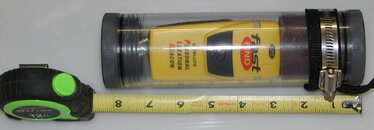coolhandcarter
Registered
I think that it is very unlikely to find yourself outside of the 8 mile range under most diving circumstances. 8 miles is a very long way on the open ocean especially for most dive boats being smaller and traveling slow IOT provide better comfort for the more weary divers.
Also the EPIRB is not a small device. Adding such capabilities to a device meant to be small and portable in the off chance that someone has a 1:100,000,000 chance of being out of the 8 mile range would probably make it less marketable to people looking for a small device more than it would be for someone looking for the EPIRB type system.
Also the EPIRB is not a small device. Adding such capabilities to a device meant to be small and portable in the off chance that someone has a 1:100,000,000 chance of being out of the 8 mile range would probably make it less marketable to people looking for a small device more than it would be for someone looking for the EPIRB type system.




